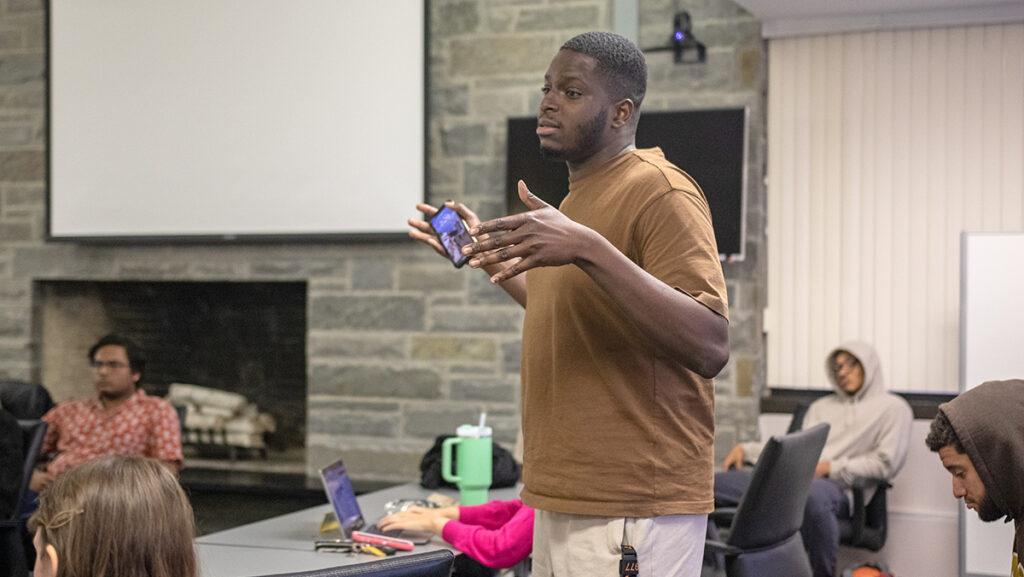The Ithaca College Student Governance Council gave the vote counts from the Spring 2023 elections to The Ithacan on May 2, revealing that first-year Matthew Williams — who was disqualified — beat the elected president by 83 votes.
The new SGC overturned the former Election Committee’s decision after the student body expressed concern about the validity of the election process and the judgment to withhold the votes. The statement shows that Williams received 191 votes and the elected president, junior Carli McConnell received 108 votes. The votes had been solidified before Williams was disqualified from the elections.
Candidates gave platform presentations April 18 and 310 students voted on IC Engage between April 20 and 24. What students did not know at the time was that Williams, then-senator-at-large and candidate for the president of the student body, was racking up campaign violation points — known as demerits — and a day after voting ended, was ultimately disqualified from the elections.
The SGC Elections Committee oversees the rules and procedures to ensure a fair election occurs, and for this election, it was comprised of seniors then-Senate Chair Austin Ruffino and Grace Madeya, then-president of the student body. Sarah Boniche, SGC adviser and associate director of student involvement in the Office of Student Engagement, does not have a say in election matters but was involved in discussions throughout.
Ruffino said he stands by the decisions made because they ensured a fair election. However, he said it was a difficult decision to disqualify Williams because they had worked together all semester.
“If it’s not targeted at me, it’s simply just an unfair election process,” Williams said. “I feel as if I’ve been cheated, and cheated in the sense that I don’t think there’s been a comprehensive decision-making process that I can really trust.”
Vote counts
As a result of feedback and pressure from the student body, the SGC senate informally voted May 1 to overturn the decision of the former Elections Committee to withhold vote counts. The statement also says the SGC will create a bill to ensure votes per candidate are released after each cycle.
[slideshow_deploy id=’47604′]
“During the Community Session of our meeting, we heard ardent feedback about the elections process and the publication of the results,” the statement said. “The new Executive Board of SGC has heard extensively that the demerits resulting in the above disqualification were issued with no uncertainty. We uphold the firm decision of the Elections Committee, as a result of multitudinous infractions on the candidate’s part.”
Prior to this information from SGC’s statement May 2, students shared frustrations with the initial decision to keep the votes private.
“Voting results are not being released for the first time in years — if they’ve ever been withheld in the past,” Williams said April 30. “I find it kind of strange that this is the time when they would make such a big decision.”
Some students commented on the SGC Instagram post announcing the elected candidates with comments like, “this is wrong and y’all KNOW IT” and “#releasethevotes.”
Ruffino said he and Madeya decided in advance of the election cycle to not release vote counts. This was the first election in which e-board candidates could run individually instead of as a slate, and Ruffino said he and Madeya did not want the elected e-board to be discouraged by the number of students who voted for them. This decision was not discussed with other members of the SGC e-board and Senate because releasing votes was not written in the SGC Constitution.
“It was kind of just one of those things where we kept doing it because it was the way things have always been done,” Ruffino said.
SGC meeting May 1
The newly-elected SGC led by McConnell met for the first time May 1. Ruffino, Madeya and Boniche attended, as well as 12 guests who went to demand the vote count results be released. Eleanor Paterson, Class of 2026 senator, was elected by the council to be the senate chair, and the entirety of the meeting after was spent discussing the election process.
Ruffino said that because his term ended, this issue is something the new Election Board can solve.
Madeya said that the release of election results has affected candidates’ and members’ decisions to rerun in elections as well as how SGC members work while on the council.
“Everything the elections committee did was with positive intent toward the future of SGC,” Madeya said. “In the past, when we published results it prohibits people from doing their best work … especially when they compare themselves to others.”
Junior Liguori Flanagan said that votes not being released is unfair to the candidates and to the students.
“If we as a community or school understand that it’s unfair, we are wasting our time at this meeting,” Flanagan said. “As someone who is a student who wants to keep the positive notion this school wants to push: this is wrong.”
The group questioned the council on when the votes can be released, wanting it to be as soon as possible. Senior Shevori Gene, who formerly served on SGC as chief of staff, said he is concerned the votes will not be released despite the guests being vocal.
“We’re afraid we’re going to come here, vocalize, leave, and nothing is going to happen,” Gene said. “We don’t want to leave and have nothing happen. … When can that decision be made and can it be made now?”
The SGC decided to move into executive session to consider next steps of releasing the votes.
The meeting was adjourned during the executive session and the SGC members promptly left without notifying the 12 guests who were waiting in another room.
Gene said they found this process to be very disheartening and that it is hurting SGC’s reputation.
“It’s not OK to have rules changed like this while we’re going through an election,” Gene said. “Decisions that come out of this room should be respected and they won’t be respected if things like this continue to happen.”
Disqualification
Among other rules, campaign materials like posters must be distributed in accordance with college policy, according to the SGC Constitution. Materials can be posted on general-use bulletin boards but may not be posted on waste receptacles, trees, walk surfaces, walls, doors, windows, roads or vehicles, according to the college’s Advertising and Solicitation Policy.
Williams was initially cited for eight demerits but ultimately received five after appealing his violations several times, according to email correspondence between Williams and the Elections Committee obtained by The Ithacan. All of the violations fell under the solicitation policy — a minor infraction worth one or two demerits — or the accessibility rule — a major infraction worth two to four demerits — which states that candidates are not permitted to use any type of communication or campaigning that is not equally accessible to other candidates.
Williams did not receive any egregious infractions, which would be four or more demerits. All demerits are given at the discretion of the elections committee and are outlined in the SGC Constitution. If a candidate receives five or more demerits, they are disqualified from the election.
On April 21, Ruffino contacted Williams to notify him that three campaign posters were found on walls and one was found on a door — resulting in four demerits. On April 23, Williams appealed the demerits, which the Elections Committee denied.
Williams said he made sure to explain to his peers who helped put posters up around campus which locations were permitted by college policy. He said he printed around 200 posters to be distributed and feels he cannot be held liable when he did everything he could.
“It doesn’t make sense to me that I’m being punished for something that I tried so hard to prevent,” Williams said. “A random individual I never authorized to even touch a poster could take it, put it on a wall, take a picture and that would be it.”
The voting period was scheduled to end April 21 but was delayed until April 22 because the Elections Committee did not get the roster of candidate information from the Office of Registrar for the ballot form. The voting period was extended again because students were unable to sign in to IC Engage. This resulted in an extension of the voting and campaign period to midnight April 24. The last time IC Engage experienced an outage was September 2022. No recent incidents of issues with the platform have been reported, according to the Engage Status Page.
“The homepage of the website loaded without any problems; however, students were unable to sign in, meaning they were unable to vote,” Ruffino said via email. “This is not reflected on the IT status site. … I kept waiting for it to update but it never did.”
Williams appealed the demerits again April 24, which the Elections Committee accepted and reduced the demerits to two for all four solicitation violations. However, in the same email accepting the appeal, the Elections Committee notified Williams of two more violations regarding his campaign materials. The committee did not give the number of demerits for the violations or which policies the violations referred to. One violation was for promotional materials for Williams’ campaign found advertised on digital screens in the James J. Whalen Center for Music. Ruffino said the committee confirmed with an employee in the Office of Information Technology that the use of LCD screens would not be accessible for all students.
The second was for a campaign poster found on the door of Egbert Hall room 339, which, in the email, was said to violate both the solicitation policy and the SGC’s accessibility policy. The door for Egbert 339 leads into the offices for the MLK Scholars and First-Generation Programs and the Center for Inclusion, Diversity, Equity and Social Change.
“Not necessarily all students would be able to access the Center [for] IDEAS and get their campaign material on the door,” Ruffino said. “It is expected that you would need to have some sort of connection to that center in order to get the poster there.”
Angélica Carrington, director of the Center for IDEAS, said via email that any student could ask to have a poster put up.
“Students come by asking how they can go about promoting or if we can help share about their event or their recitals,” Carrington said via email. “We welcome any student to our space, and would happily promote and support any items that they share with us.”
When asked why the Elections Committee chose to confirm that the LCD screens would not be accessible to all students but did not confirm the Egbert 339 violation, Ruffino said they did not confirm the Egbert 339 violation because it would have been a violation either way.
“The LCD screens were completely foreign to us,” Ruffino said. “We didn’t even know how they worked. And that’s why we did that process. We did not reach out [to the office], the burden would be on the candidates to give us that information.”
In regard to the poster being on the door of Egbert 339, Ruffino said the Elections Committee did not confirm if college offices have the authority to post materials on their own doors. He said that even if offices have that authority, it is still a violation of the solicitation policy.
“Even if someone were to be given permission to violate one of our rules, that doesn’t change the fact that the rule is there,” Ruffino said. “Regardless of whether there were any investigations [by us] for any of it … a different campus policy that says something other than ours doesn’t necessarily supersede ours.”
The committee requested to meet with Williams on April 25 — after the campaign period was set to be over — to discuss the violations.
On the evening of April 25, after the meeting occurred, the Elections Committee sent Williams a written decision regarding his violations and candidacy that explained he was disqualified. He was given two more demerits for the violations mentioned April 24. This violation brought Williams to six demerits despite the campaign period already being over. He appealed the violation and it was brought to five, which is enough to still be disqualified. Additionally, because the voting period was over and candidate results were publicly released, the Elections Committee refused to handle further appeals.
Ruffino said the demerit after voting ended was given because it could have unfairly impacted the results. He said demerits can be given for violations that occur before and after the campaign period. However, that is not stated in the Constitution, which Williams said seems like a violation of the policies on the part of the Elections Committee.
“All candidates during elections can be given demerits if they violate any campaigning procedures or guidelines set forth by this Constitution,” the SGC Constitution states.
Boniche offered to meet with Williams on April 28 to discuss his feelings after the election cycle closed. Williams notified Boniche prior to the scheduled meeting that he would bring a reporter from The Ithacan to talk about the election. In response, Boniche canceled the meeting and said he could reschedule if he wished to meet alone.
“My offer to meet with you was intended to discuss your feelings after the elections cycle has closed; I have no intention of speaking with other students regarding the elections process, your disqualification, or the results,” Boniche said to Williams via email. “Did you invite The Ithacan to this meeting? I am very interested to hear from you what you thought that would accomplish from doing that and what you are hoping the outcome will be here.”
Williams said it does not make sense to him why Boniche said she will not speak to other students about the process, his disqualification or the results.
“You’re telling me the students who help to make this entire thing possible, the students who probably one day will eventually become members of SGC — and if not, they will continue to vote and literally give SGC meaning — those are the students you don’t want to talk to about the elections process, my disqualification or the results, the results that they voted to create?” Williams said when discussing Boniche’s response. “When you put together all of these coincidences, there’s something very, very strange about it.”










